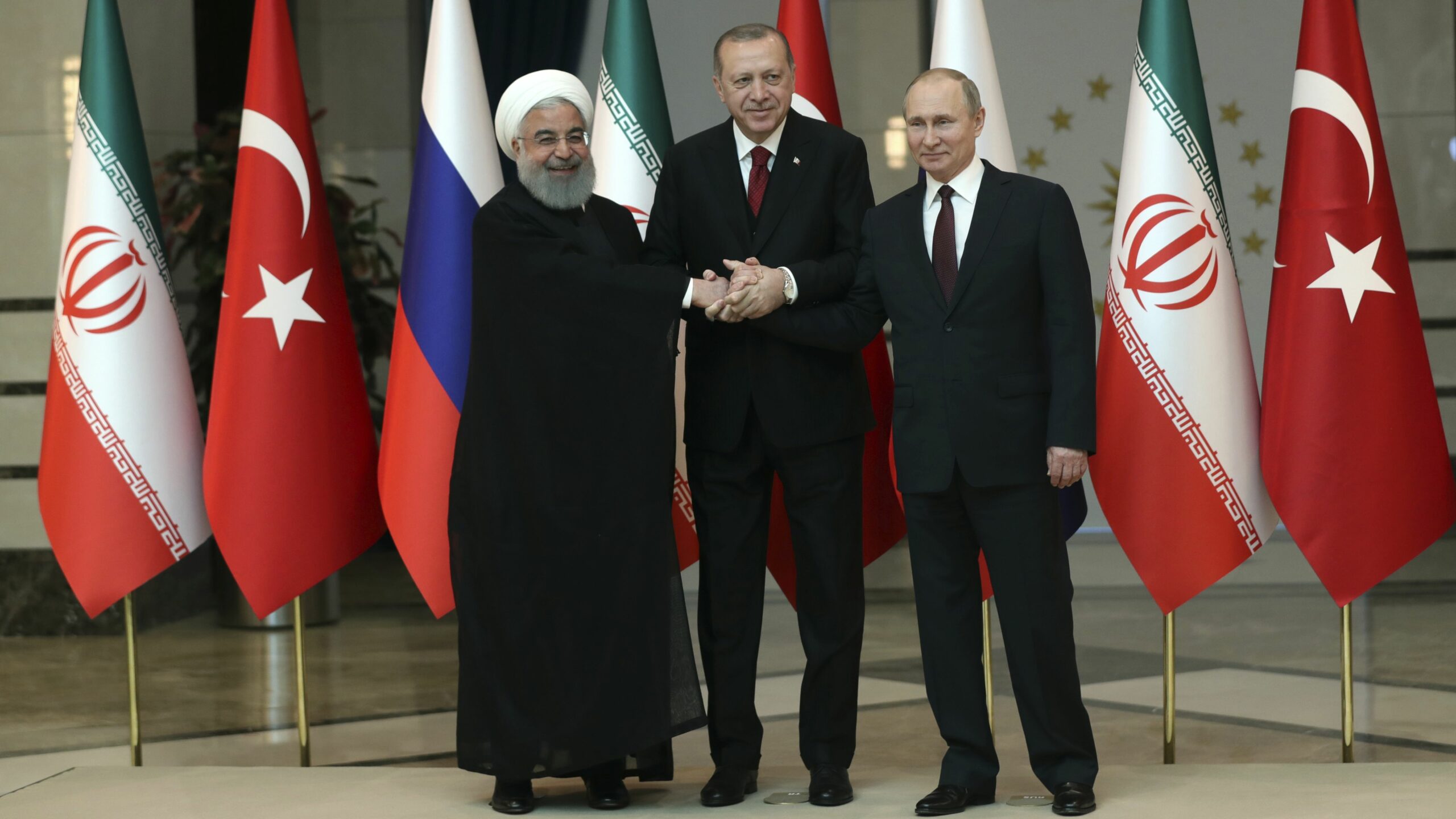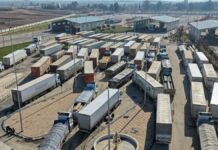
Recent weeks have seen overtures of rapprochement towards the Assad regime by Turkey’s President Erdogan, which has stirred significant debate and concern among various stakeholders. This is not the first time Erdogan has courted Assad, yet these most recent efforts have sparked more than just impassioned debate. Turkish-administered areas of northern Syria have erupted in protests and attacks on Turkish institutions and troops in the wake of anti-Syrian, and pro-regime rhetoric in Turkey.
Likewise, the weeks following Erdogan’s very public pursuit of Assad have seen a sharp increase in attacks on northern Syria, including the return of Russian airstrikes and jets to the skies after a nearly two-month absence and flights of Russian jets over Turkish-backed northern Aleppo for the first time in years. All this has led refugees, analysts, and civilians on both sides of the border asking; “why now, and what might the future hold?”
Political Motivations
For more than a decade, the relationship between Turkey and the Assad regime has been fraught with tension and conflict. However, recent moves towards normalization can be attributed to a confluence of domestic and regional strategic interests. A faltering economy, contested election cycles, and anti-refugee and Syrian sentiment, coupled with increasing fears of a burgeoning separatist Kurdish state helmed by the PKK have set the stage for Turkish outreach.
There is a pressing domestic need to address the Syrian refugee crisis in Turkey, which has become a contentious political issue for Erdogan’s ruling AKP party. With millions of Syrian refugees in Turkey, Erdogan is under pressure to facilitate their return to Syria to mitigate domestic unrest and improve his political standing. There are also aims to secure Turkey’s southern borders from the PKK-aligned Syrian Democratic Forces (SDF) which Ankara considers a terrorist organization. Turkey seeks assurances from Assad regarding the elimination of this threat along its border.
These overtures toward Assad have also been encouraged by Assad allies like Russia says Charles Lister, a senior fellow at the Middle East Institute who told L24, “a serious and concerted effort underway by Russia, Iran, Iraq and Damascus to shape conditions in which Turkey normalizing might become more feasible and attractive.” They are also driven, asserts Lister, by “domestic politics, regional geopolitical shifts, and as a renewed attempt to pressure the US into making concessions (regarding the SDF) in the northeast.”

Syrian author, Muhammad Alwan, who spoke with L24, agrees, “I expect that the rapprochement will be limited only to the file of fighting separatist parties to protect its national security.” However, Alwan posits that Russia’s hand in encouraging normalization is due to its preoccupation in Ukraine and fears of ceding more power to Iran, “Russia, which is busy with its war in Ukraine, is pushing Turkey to fill the vacuum that it may leave in Syria to deprive Iran of that.”
Yet most Syrians, especially those in northern Syria, are more concerned with the possible impact any normalization might have on them, their safety, and their revolutionary aspirations of a liberated and dignified Syria free of Assad.
Impact on Syrian Refugees in Turkey
Turkey currently hosts over 3.5 million Syrian refugees, whose fate hangs in the balance amidst the rapprochement discussions. The potential for the forced return of Syrian refugees poses severe humanitarian and legal implications. According to Turkish sources, at least 670,000 Syrian refugees have “voluntarily” returned to Turkish-controlled northern Syria. However many human rights groups have noted that thousands of Syrians have been arrested and forcefully returned to Syria against their wishes.
The volatile nature of the dynamics between the issue of Syrian refugees and internal and external Turkish politics was made abundantly clear in the outbreaks of anti-Syrian violence earlier this month. Attacks on Syrians began in Turkey’s Kayseri before spreading to Gaziantep, Hatay, Konya, Bursa, and Istanbul, and even spilling over the border into northern Syria where clashes between factions of the Turkish-backed SNA and Turkish military took place. Normalization poses increased risks to Syrians as it presents the false narrative that Syria is safe for return.
A Danger to the Revolution?
If normalization efforts succeed, the impact on the Syrian people and their revolution could be severe. Revolutionary groups worry that a deal between Turkey and Assad could legitimize Assad’s regime, marginalize their influence, and lead to renewed crackdowns and attacks on liberated areas. The situation could also exacerbate the plight of Syrian refugees in Turkey if they are forced to return to an unstable and hostile environment.

An Exercise in Futility
Previous normalization efforts with the Assad regime offer a mixed bag of outcomes, providing valuable lessons for current discussions. Alwan notes that normalization by countries like the UAE, Bahrain, Oman, Jordan, and Saudi Arabia has not led to significant improvements in areas controlled by the Assad regime – nor with its poor conduct towards normalizing nations. Instead, the general conditions for the Syrian people have deteriorated. “As for the Assad regime, it basically has nothing to offer those countries after Russia and Iran divided the economic resources in the regime areas and left it with nothing.”
As Syrian journalist and political analyst, Ahmad Zaidan commented in a recent article on failed past normalization efforts, “Turkey is entering the reconciliation process, and in my opinion, the experience will not be any better than previous Arab experiences. Assad is not subject to change, and his promises cannot be trusted.” Zaidan points out that “throughout the years of the revolution, we have not seen any concessions from Assad and his allies”. Conversely he stresses that alleged “allies of the revolution,” have consonantly made concessions to the Assad regime at the expense of the Syrian people which has only served to “strengthen (Assad’s) intransigence and adherence to his positions.”
Turkey, Syria, and Beyond
Both Iran and Russia have vested interests in Syria and have supported the Assad regime militarily and politically. While Russia has mediated talks, it prefers the discussions to take place in Turkey rather than Iraq, indicating its strategic interests in controlling the negotiation environment. Iran, on the other hand, seeks to ensure its influence is not diminished in the process and is passively opposing Russian efforts.

Tehran fears Turkey regaining its former closeness to the regime, while Russia sees bringing Erdogan on board as not only a means of countering Iran but the US and Western interests, especially NATO as Kemal explains, “Although Turkey is a NATO member, recent years it has shown a strong pro-Russian bias and therefore has serious problems with the Western bloc. But Turkey would face a serious complication in such an outcome: Iranian expansionism. If it can take this serious risk, Turkey can normalize with the Assad regime. But Iran and the fanatical Shiite terrorists it supports represent a greater danger than the PKK and other organizations.”
How Ankara intends to balance the complex network of interests in Syria remains unseen yet those with the most at stake, at the greatest say, remain as always, the Syrian people. Lister reminds that while “[Turkey is] well aware of the enormous obstacles in the way, most of what we’re hearing from Ankara should be treated as politics, rather than policy. [Yet] … Syrians are the ones with everything to lose, and that’s all too often forgotten amidst all the political noise.”








